KCTV-5 taps UMKC Bloch assistant professor for insight
University of Missouri-Kansas City Assistant Professor of Marketing and Supply Chain Management Larry Wigger believes much of the supply constraints of certain products could go on into late next year. Read the full article and watch the newscast.
Dec 01, 2020
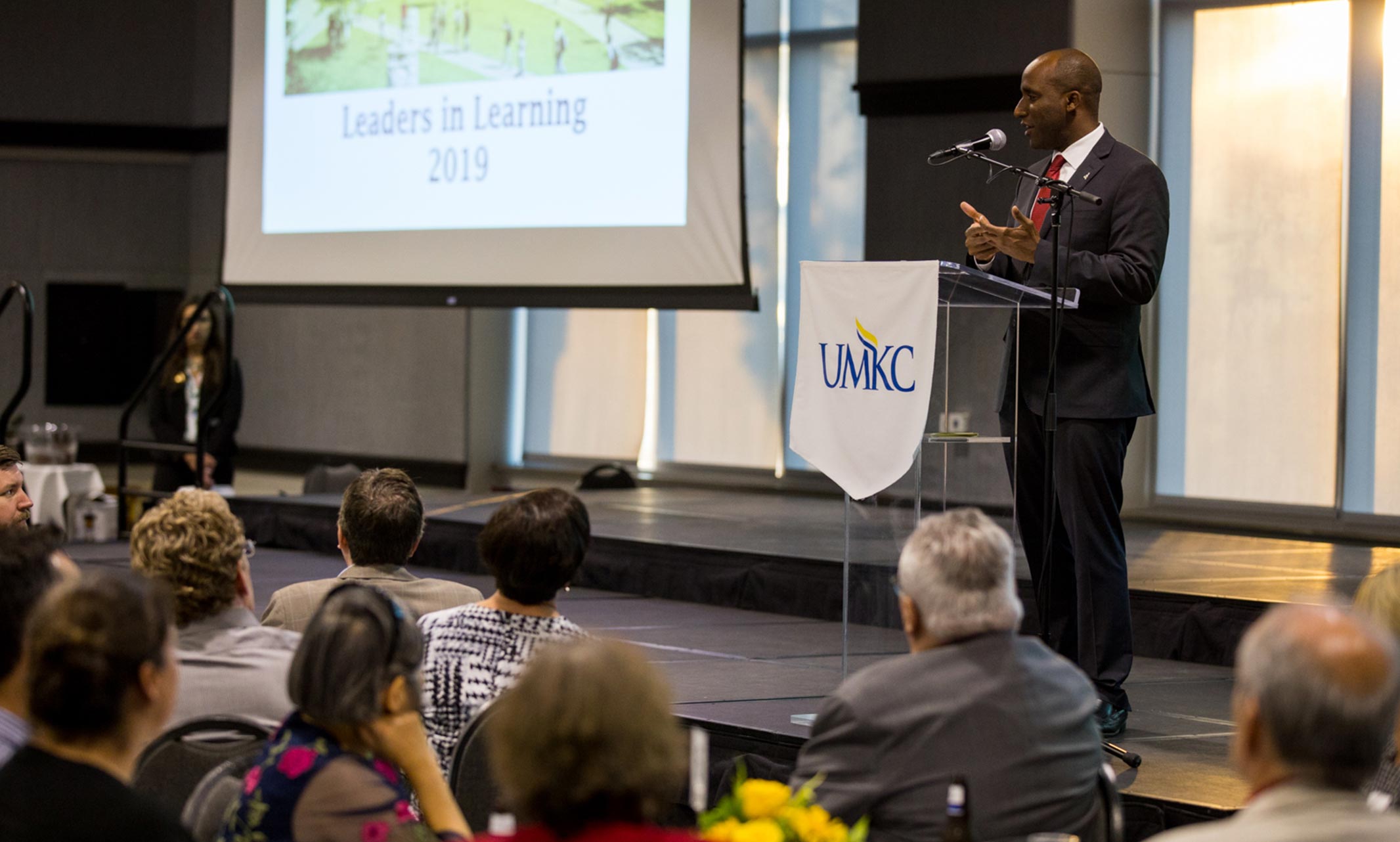
Faculty will be recognized in a video celebrating their accomplishments
More than 60 UMKC faculty have been recognized in 2020 with honors such as promotion, tenure, endowed chairs, distinguished professorships and unique UMKC and UM System honors.
These recognitions occur throughout the year, and are typically celebrated together at an annual event. These honors have taken on special meaning this year as the faculty, and all members of the university community, have faced unprecedented challenges in dealing with the COVID-19 pandemic.
Large in-person gatherings remain inadvisable due to the pandemic. Instead of a live event, faculty will be recognized in a special video celebrating their accomplishments. The first showing of the video will take place on the evening of Feb. 12, and will be posted on the Provost’s website for the remainder of the year
“The effort, flexibility and patience our faculty have put into this difficult year have not gone unnoticed, and it is especially important to recognize the significant contributions of our faculty this year,” said Chancellor Mauli Agrawal. “Many of our students say their relationships with our faculty are some of the biggest reasons they love being a Roo.”
Faculty recognitions for 2020 include:
New Curators Distinguished Professor: A curators’ distinguished professorship is the highest and most prestigious academic rank awarded by the Board of Curators of the University of Missouri.
Sarah Dallas, Ph.D., School of Dentistry
New Endowed Chairs:
Charles Murnieks, Ph.D., Arvin Gottlieb Chair in Business Economics, Bloch School of Management
Jennaya Robison, DMA, Raymond R. Neevel/Missouri Professorship in Choral Music, Conservatory
Kelly Suchman, D.D.S., Dr. S. Orlando Somers Professorship in Advanced General Dentistry, School of Dentistry
Jean Marc Retrouvey, D.M.D., M.Sc., Dr. Leo A. Rogers Professorship In Orthodontics, School of Dentistry
Carolyn Barber, Ph.D., Ewing Marion Kauffman Foundation/Missouri Endowed Chair of Teacher Education, School of Education
Jannette Berkley-Patton, Ph.D., James B. Nutter, Annabel Nutter and Harry Jonas M.D. Professorship, School of Medicine
Mamta Reddy, M.D., Vijay Babu Rayudu Endowed Chair of Patient Safety, School of Medicine
Governor's Award for Excellence in Education: The Governor’s Award for Excellence in Education is presented to an outstanding faculty member from each participating higher education institution in the state based on evidence of effective teaching, effective advising, a commitment to high standards of excellence and success in nurturing student achievement.
Michael Wei, Ph.D., professor, School of Education
Chancellor's Award for Career Contributions to the University: One of the highest honors for a UMKC employee who has made significant contributions to higher education at UMKC over the course of their career and has significantly enhanced the mission of the university.
Paul Cuddy, Pharm.D., vice dean and professor, School of Medicine
Chancellor's Award for Embracing Diversity: This award recognizes and celebrates UMKC faculty, staff and registered student organizations that embrace diversity by celebrating diversity in all aspects of university life, creating inclusive environments, culturally competent citizens and globally-oriented curricula and programs.
School of Medicine Summer Scholars Program, School of Medicine
Tammy Welchert, Ph.D., associate teaching professor and director of student affairs and academic advising, School of Biological and Chemical Sciences
Chancellor's Award for Community Engagement: This award recognizes and celebrates faculty, staff, units and campus organizations that have made engagement with the community a central aspect of their approach to student learning and scholarship.
Julie Sutton, R.D.H., M.S., associate professor, School of Dentistry
Chancellor's Early Career Award for Excellence in Teaching: This award recognizes and celebrates UMKC assistant professors who have achieved excellence in teaching early in their professional careers.
Sandra Enriquez, Ph.D., assistant professor, College of Arts and Sciences
Chancellor's Award for Excellence in Teaching: The university’s highest honor for excellence in teaching recognizes and celebrates UMKC faculty who are consistently superior teachers at the graduate, undergraduate or professional level over an extended period of time.
Mike Wacker, Ph.D., associate professor, School of Medicine
Chancellor's Award for Excellence in Graduate Mentoring: This award recognizes UMKC graduate faculty advisors with a long-established career at the university who have made significant contributions to higher education through exceptional mentoring.
Kun Cheng, Ph.D., professor, School of Pharmacy
Provost's Award for Excellence in Teaching: This award recognizes and celebrates teaching excellence among UMKC clinical and teaching faculty.
Rachael Allen, Ph.D., assistant teaching professor, School of Biological and Chemical Sciences
Rebecca Davis, Ph.D., associate teaching professor, College of Arts and Sciences
Monica Gaddis, Ph.D., associate teaching professor, School of Medicine
Elmer F. Pierson Good Teaching Awards: Awarded annually to outstanding teachers in the Henry W. Bloch School of Management, and the Schools of Dentistry, Law and Medicine.
Eric Gottman, D.D.S., M.S., clinical professor, School of Dentistry
Jennifer Quaintance, Ph.D., assistant dean, School of Medicine
Ranjit Christopher, Ph.D., assistant professor, Bloch School of Management
Julie Cheslik, J.D., associate professor, School of Law
Award for Achievement in Assessment of Student Learning: Recognizes individuals and programs with assessment protocols that promote student achievement in the classroom or in academic programs.
The B.A. in Music Therapy, Conservatory
Kim Langrehr, Ph.D., associate professor, School of Education
N.T. Veatch Award for Distinguished Research and Creative Activity: Recognizes distinguished research and other scholarly or creative activity accomplished by UMKC faculty.
Ganesh Thiagarajan, Ph.D., professor, School of Computing and Engineering
Trustees Faculty Fellows Award: Trustees are recognizing the very best faculty who distinguished themselves through scholarship and creativity.
Peter Koulen, Ph.D., professor, School of Medicine
Trustees Faculty Scholars Award: Recognizes faculty members who show exceptional promise for outstanding future research and/or creative accomplishments.
Alison DeSimone, Ph.D., assistant professor, Conservatory
UM System President's Award for Innovative Teaching: Recognizes faculty who are outstanding teachers and who employ novel and innovative teaching methods to achieve success in student learning.
Richard Delaware, Ph.D., Teaching Professor, College of Arts and Sciences
UM System President's Award for Inter-Campus Collaboration: Recognizes faculty who engage in activities that foster collaboration across two or more campuses of the University of Missouri System.
Sarah Pilgrim, Ph.D., Assistant Professor, College of Arts and Sciences
UM System Presidential Engagement Fellows: The fellows are tasked with fulfilling the university’s land-grant mission by sharing research discoveries with Missouri citizens in every county. They were selected for their excellent teaching, breakthrough research and creative achievements.
Jamila Jefferson-Jones, J.D., professor, School of Law
Joey Lightner, Ph.D., assistant professor, School of Nursing and Health Sciences
Joan McDowd, Ph.D., professor and chair of psychology, College of Arts and Sciences
Promotion and Tenure:
Ahmed Hassan, Ph.D., tenure with promotion to associate professor, School of Computing and Engineering
Antonis Stylianou, Ph.D., tenure with promotion to associate professor, School of Computing and Engineering
Candace Schlein, Ph.D., promotion to professor, School of Education
Jamila Jefferson-Jones, J.D., promotion to professor, School of Law
Jason Martin, Ph.D., tenure with promotion to associate professor, College of Arts and Sciences
Jenifer Allsworth, Ph.D., tenure, School of Medicine
Julie Sutton, R.D.H., M.S., tenure with promotion to associate professor, School of Dentistry
Kenneth Ferguson, J.D., promotion to professor, School of Law
Maria Kanyova, DMA, tenure, Conservatory
Michael Mermagen, M.M., tenure with promotion to professor, Conservatory
Michael Wei, Ph.D., promotion to professor, School of Education
Rebecca Best, Ph.D., tenure with promotion to associate professor, College of Arts and Sciences
Ricky Allman, MFA, promotion to professor, College of Arts and Sciences
Scott Baker, Ph.D., promotion to professor, College of Arts and Sciences
Tanya Gibson, D.D.S., tenure with promotion to associate professor, School of Dentistry
Non-Tenure-Track Promotions:
Melynda Meredith, D.D.S., promotion to clinical associate professor, School of Dentistry
Dominick Salvatore, Pharm.D., promotion to clinical associate professor, School of Pharmacy
Lance Carter, MS, promotion to associate teaching professor, School of Medicine
Sadie DeSantis, MFA, promotion to associate teaching professor, Conservatory
Kendall Bingham, Ph.D., promotion to assistant teaching professor, School of Computing and Engineering
Mahbube Siddiki, Ph.D., promotion to assistant teaching professor School of Computing and Engineering
Katherine Bloemker, Ph.D., promotion to teaching professor, School of Computing and Engineering
Lindsey Arbuthnot Clancey, MS, promotion to associate teaching professor College of Arts and Sciences
Joshua Pluta, J.D., promotion to librarian III, School of Law
Jamie Hunt, Ph.D., promotion to associate teaching professor, School of Nursing and Health Studies
Cheri Barber, DNP, RN, CPNP, promotion to associate clinical professor, School of Nursing and Health Studies
Eileen Amari-Vaught, Ph.D., promotion to associate clinical professor, School of Nursing and Health Studies
Tho Nguyen, DNP, promotion to associate clinical professor, School of Nursing and Health Studies
Laura Thiem, DNP, promotion to associate clinical professor, School of Nursing and Health Studies
Lynn Michaelle Tobin, J.D., promotion to clinical professor, School of Law
Margaret Reuter, J.D., promotion to clinical professor, School of Law
Nov 30, 2020
KBIA interviews UMKC researchers about their report
Gun-related suicides among young people in Missouri rose sharply after legislators relaxed state gun laws, based on a new report from the University of Missouri-Kansas City School of Medicine. Jeffrey Metzner, associate professor of psychiatry; and Apurva Bhatt, psychiatry resident, are co-authors and were interviewed for this story. This St. Louis Public Radio story was picked up by KCUR.
Nov 30, 2020
Washington Post cites report authored by Mary Anne Jackson
Mary Anne Jackson, an infectious diseases doctor at the University of Missouri-Kansas City and Children’s Mercy Hospital, is co-author of a Pediatrics paper cited. She was mentioned in the article.
Nov 28, 2020
Fox4KC taps Economics associate professor
COVID-19 forcing a new way of shopping for the holidays could signal the death of Black Friday, UMKC Economics Associate Professor Linwood Tauheed said. Read the story and watch the newscast.
Nov 25, 2020
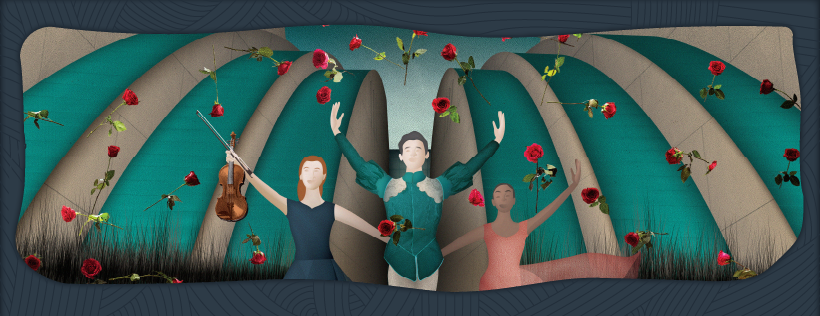
Over $590,000 raised in this year’s fundraiser
Dozens of UMKC Conservatory students and faculty made Crescendo 2020 an event to remember during this challenging year, and so far, the event has raised over $590,000 for student scholarships.
Due to COVID-19, Crescendo 2020 shifted from an in-person performance to a streamed event. The concert on Nov. 6 featured performances and interviews with inspiring students. Co-chairs were Amy Embry and Nicole Wang. Honorary co-chairs were Carrie and Casey McLiney.
“Since moving Crescendo to the Kauffman Center in 2012, we have raised over $3 million in scholarship funds,” said UMKC Conservatory Dean Diane Petrella.
As Crescendo has grown, organizers actively sought ways to expand the impact of this performance. Three years ago, the UMKC Conservatory hosted the first matinee performances of the Crescendo Concert, busing middle and high school students from all over the Kansas City area to the Kauffman Center.
“For many of these kids, this was the first time they’ve experienced a performance of this caliber,” Petrella said. “Last year, through grant and private funding, we expanded this outreach to two performances, with over 2,500 students attending matinees.”
As the 2020 Crescendo Concert went virtual, so did the matinees. Arrangements were made for thousands of children to view the virtual performances, which not only supported the Conservatory’s efforts in community outreach, but also helped UMKC to connect with local talent to recruit the next generation of artists to the Conservatory. The 2020 matinees were sponsored by Julie and Mike Kirk and Evergy.
“Performing artists everywhere are struggling, trying to retain a presence in a society that cannot physically come together,” Petrella said.
“Despite these challenges, artists everywhere continue to demonstrate that the arts are a critical component of our society. Artists are strong. Artists are resilient. We find ways to connect, to continue to shine and to creatively express ourselves." - UMKC Conservatory Dean Diane Petrella
"Guided by the amazing faculty of the UMKC Conservatory, UMKC students found a way to continue studying and creating art — proving over and over again that the arts can transcend all boundaries,” Petrella said.
While this year’s event was different, patrons still had the opportunity to witness the tremendous talent at the UMKC Conservatory. All of the proceeds raised provide scholarships for exceptional students. Scholarships makes pursuing a degree in the performing arts an affordable option and makes UMKC Conservatory a more attractive and competitive choice.
On show “night,” patrons saw those students who bravely accepted the challenges before them and heard from some of the students who received scholarships.
The Performances
Mas Fuerté (1992) by Stephen Rush (b. 1958), UMKC Percussion Ensemble with Professor Nick Petrella, faculty coach.
When We Love (2019) by Elaine Hagenberg, Conservatory Singers with Professor Jennaya Robison, director.
Jose Mendoza and Erin Besser
One of the first student interviews were with Conservatory singers Jose Mendoza and Erin Besser.
“When I was searching for a grad school I was searching not only for a place that would be something I wanted academically but also in the community,” Besser said.
“The reason that my scholarship is so important to me is that I wouldn’t be here without it." - Erin Besser
"The fact that I can be on scholarship and not have to worry about funding my education gives me the peace of mind I need to succeed in my classes,” Besser added.
“For my undergrad I wanted a place where I could feel like I’m home,” Mendoza said. “I can just walk into any building and feel so comfortable and welcomed. The scholarship helps me in a big way. College these days is rigorous and stressful as it is, so having these scholarships helps alleviate that stress and that back-of-the-mind-worry about money.”
A scene from Othello (1603) by William Shakespeare (1564–1616), Meredith Johnson (M.F.A., acting and directing) with Kim Martin-Cotten, director.
After You, Mr. Gershwin! (2004) by Béla Kovács (b. 1937), Dana Sloter, clarinet (D.M.A., clarinet performance) with Professor Dan Velicer, piano.
The Dying Swan (1886) by Camille Saint-Saëns (1835–1921), Michel Fokine, choreographer, with dancers Derrian Simone Davis (B.F.A., dance), Liat Roth (B.F.A., dance) and Ashlyn Zay (B.F.A., dance), Larry Hernandez, cello (Artist’s Certificate, cello), Mary Gossell, piano (D.M.A., piano performance), professor Ronn Tice, faculty coach.
“I think it’s a really difficult time in the world of dance because so much of dance is about connecting with each other and touching each other.” - Dance Student Liat Roth
“So missing that, it’s nice to collaborate with other types of artists, like all of the musicians we have at UMKC,” Roth said.
“I think it’s also nice to just dance with each other because it’s usually a really connected art form,” said dance student Ashlyn Zay. “Even though we can’t touch each other we can still feel each other in the music. I personally love dancing to live music. I just feel like it completely brings it to life. You feel like it’s real and it’s right there in front of you.”
“For me, this was my first time to perform with dancers, so it was really a magical experience,” said dance student Mary Gossell. “I’m also a graduate assistant in collaborative piano and I’m just so grateful to have received this scholarship not only because of the financial benefits, but also it’s giving me a lot of experiences already to work with other musicians and now dancers.”
“It was fabulous having these musicians here with us, said Dee Anna Hiett, associate professor and chair, dance. “We depend on those scholarship dollars to bring us talent to build our dance division, to have a successful career. To train these dancers, we really need scholarship money. And we appreciate all of those who donate and give.”
Danny Boy, Traditional arrangement by Martin Hackleman, UMKC Horn Choir, with Professor Martin Hackleman, faculty coach.
One O’Clock Jump (1937) by William Charles Basie (1904–1984) arr. Charles Kynard, Concert Jazz Band.
“I’ve been playing in the Kansas City jazz scene for about three years,” said Jackie Myers, BM in jazz studies. “UMKC is an integral part of that scene. Many of the players that I really enjoy playing with, many of the people I’m studying with, were involved in UMKC. Without scholarships I wouldn’t be here. From the bottom of my heart, thank you for this opportunity. And thank you so much for your support.”
Andrew Dressman, BM in jazz studies, is also studying saxophone studies. “Since I’ve been here it’s been an incredible experience and it makes me want to stay here for a very long time.”
“Because of your support and scholarship support, we’ve been able to attract and retain some of the finest talent in the country and from around the world,” said Bobby Watson, retired William D. and Mary Grant/Missouri Professor of Jazz Studies. “All of that is possible through your generous giving. And we hope that you can keep it up and continue to support our efforts and the great work of these students for many years to come. Thank you.”
Give to the Crescendo Conservatory student scholarship fund
Nov 24, 2020
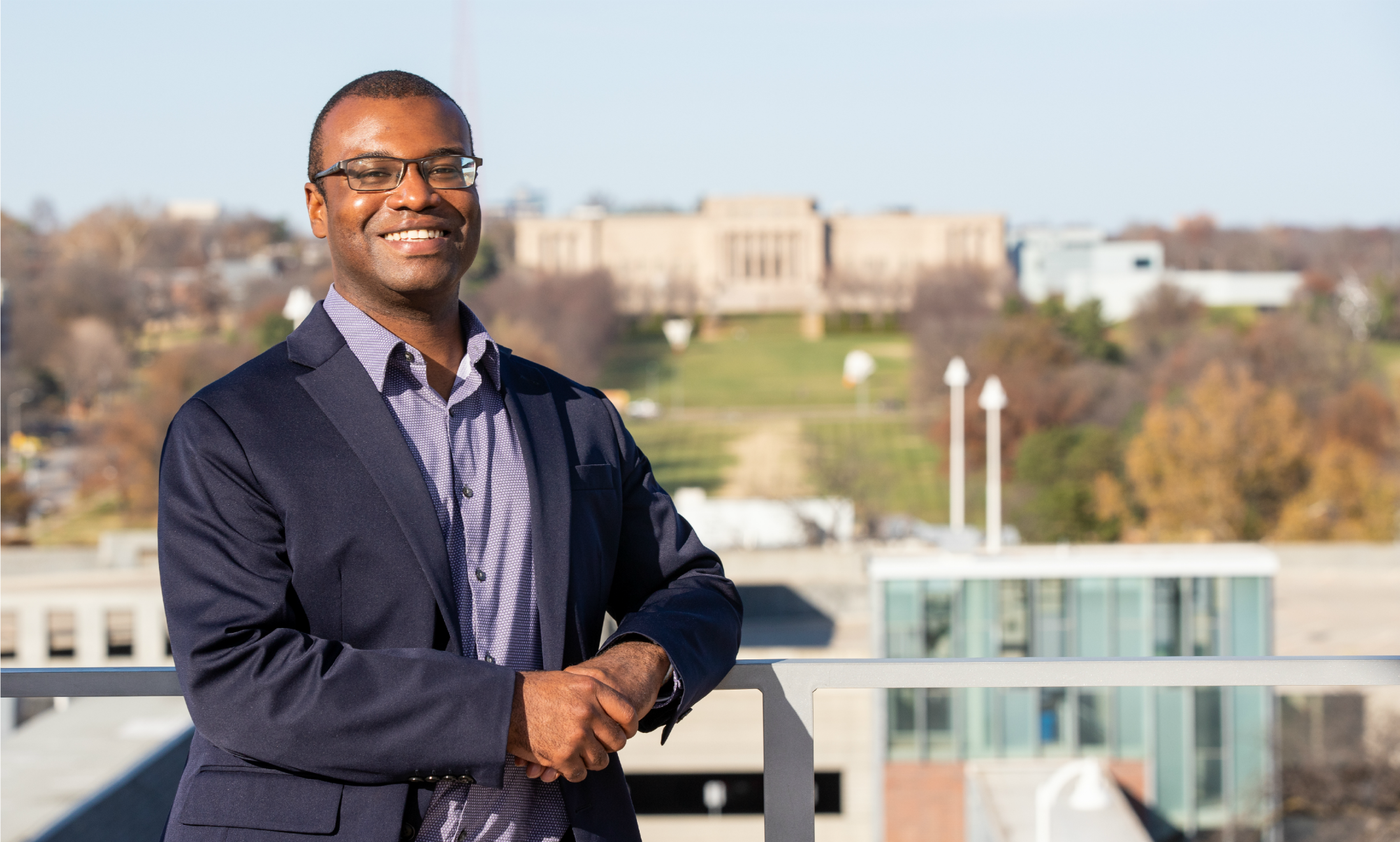
English professor Antonio Byrd is teaching his students to use writing, rhetoric and technology for liberation and survival
The Black Excellence At UMKC series helps to increase awareness of the representation of diversity and equity on campus and show a visible commitment to the inclusion and recognition of Black faculty and staff. This series celebrates and highlights Black and Roo faculty and staff working behind the scenes and on the frontlines to help our university achieve its mission to promote learning and discovery for all people at UMKC and the greater Kansas City community.
Antonio Byrd, assistant professor of English language literature, was attracted to the familiarity of UMKC. It’s here that he’s able to pay forward the experiences he had as a student, connecting with faculty and learning from his peers, from the opposite perspective.
On a mission to achieve social justice through digital literacy and technology, he’s spent the past few years studying how racially marginalized people create their own means for access through computer programming. It’s a cause that struck him as a doctoral student at the University of Wisconsin-Madison, and one he’s dedicated his research and community volunteerism to help stop.
We sat down with Byrd to learn more about his recent transition to Kansas City and his efforts to achieve racial and economic equity through digital technologies.
"Coming to UMKC felt like coming to something familiar."
Name: Antonio ByrdTitle: Assistant professor of English language and literatureTenure: 2019 - presentHometown: Prattville, AlabamaAlma Mater and Degree Program:University of Wisconsin-Madison; Ph.D. in Composition and RhetoricAuburn University at Montgomery; M.A. in Liberal Arts | B.S. in Secondary Education
Why did you choose UMKC as the place to grow your career?
I was drawn to the growing interest in digital scholarship here at UMKC, and that faculty across departments are eager to collaborate on a lot of different digital projects. I’m happy to join other faculty who have the same kind of desire to do more with digital technology. I hope our working together can blossom into practical tools and policies that address racial inequality in Kansas City.
What do you enjoy most about UMKC?
The students! During my campus visit in the spring of 2019, UMKC reminded me of the best qualities of Auburn University at Montgomery. It delights me to know that students share a large space in the hearts of my English department colleagues, who have a lot of enthusiasm for teaching and mentoring.
One of the best memories of my undergraduate days was connecting with other English majors and with my professors. That relationship building was formative for my learning and my becoming into the person I am now. I would not have pursued my doctoral degree if not for those relationships. Coming to UMKC felt like coming to something familiar.
In the short time I’ve been here, I’ve encountered a lot of ambitious students who aspire to do well and pursue projects that matter to them. My students are energized when I say, “Yes, that’s a project you should totally do!” At the same time, I feel challenged to do more as a teacher: better course design, better teaching strategies, better content.
What classes do you teach?
I teach 300-level and 400-level advanced rhetoric and writing courses, which includes courses like Theory and Practice of Composition, Rhetorics of New Media and Multimodal Rhetorics and Writing. I’m also on a mission to get more students to learn professional and technical writing.
I try to make my courses workshop- and project-based and a space where students generate knowledge from each other and the course material. We discuss how writing, rhetoric and technology contribute to oppression and racism while also encouraging students to flip the script and use writing, rhetoric and technology for liberation and survival.
I’m hoping that by the time they get tired of taking classes with me, students understand that linguistic racism persists, and as English majors, they have a duty to reveal this invisible ideology in their professional and personal lives, as well as a duty to resist participating in that racism themselves.
"I’m interested in knowing what my students are interested in."
What sparked your interest in researching race and equity in digital literacy?
While I was pursuing my doctoral degree at UW-Madison, I discovered literature published by other researchers arguing that coding is a type of writing that may eventually become required for everyday living, similar to conventional reading and writing. That made me think about the implications for putting more computer science curricula in schools.
Education in the United States is inherently unequal and designed to leave Black people out, so incorporating computer science into an already unequal education system recreates existing inequalities and continues to perpetuate a racial class system in and around computer programming. Because getting more people to learn coding was relatively new, I thought that maybe this is an opportunity for me to help stop that from happening. I wrote my seminar paper on this, and that work was foundational for my research on Black adults learning coding in a computer code bootcamp.
That question combined all of my concerns: literacy, race, technology and education.
What have you been able to accomplish in your research?
I published two articles from my dissertation! “Between Learning and Opportunity: A Study of African American Coders’ Networks of Support” in Literacy in Composition Studies and “‘Like Coming Home’: African American Adults Tinkering and Playing Toward a Computer Code Bootcamp” in College Composition and Communication. The article published in Literacy in Composition Studies was recently nominated for the Best of the Journals in Rhetoric and Composition book series.
I’m glad that the stories Black people in the computer code bootcamp where I did my research shared with me are out in the world and people are receptive to them. I’m currently working on a book project that I hope will make their stories more public and drive conversation about coding, race and equity nationwide, and especially in the Kansas City area.
How do you connect and establish relationships with other Black faculty and staff in other units and departments?
The moment I arrived at UMKC, I knew I wanted to be involved with the department of Race, Ethnicity, and Gender Studies. My associate chair, Laurie Ellinghausen, introduced me to Vice Chancellor Brandon Martin, Ed.D. and department chair Toya Like, Ph.D., who have been great for discussing ways I can tune into REGS and connect with students of color, faculty and staff. The Black & Roo Faculty/Staff Association, the affinity group for Black faculty and staff under the umbrella of the Division of Diversity and Inclusion, is another organization I will participate in. Now that I’ve settled into the groove of teaching and research here, I’m ready to connect with my own people.
"If something keeps you up at night, you should probably make that your research!"
You’re fairly new to the Kansas City area, have you had an opportunity to get involved in the community yet?
Yes! I’ve been working with Code for KC since I moved here. Code for KC is a Code for America brigade that brings together community members with a diversity of skills to work on civic tech projects that benefit Kansas City. The latest project I’m working is Re.Use.Full, a website that connects people with stuff to nonprofit organizations that need it.
I’ve done a variety of tasks with the website, from writing web content to strategizing social media marketing. The website is great for building an intimate relationship between people who have stuff to donate and community organizations. Of course, I have to do a shameless plug and encourage people to check it out and consider donating to our Give Butter campaign!
Describe your mentoring relationships with students.
I’m interested in knowing what my students are interested in. When I introduce major writing projects to my students, I always ask them to pursue what they find curious, interesting, scary, etc. Writing begins with that personal perspective and I like to support them in that work with comments. I hope the comments help them see their work differently; at least that’s often been my experience when mentors and colleagues read my drafts. I also try to be a resource. If there’s something they want to do academically or professionally, I try to point them to the right resources or people that can help get them to where they need to be.
What is one piece of advice you’ve learned as a newer faculty member that you’d pass on to someone else looking to pursue their research career?
I find it interesting to learn how scholars get into the work they do. That’s not always talked about, so I hope my own journey encourages readers in graduate school or thinking about graduate school to enjoy the ride and use their personal concerns to guide their decisions about what to research. If something keeps you up at night, you should probably make that your research!
What is one piece of advice you’d give a student wanting to follow in your footsteps?
I don’t think they should lock themselves into doing just one thing. The skills they learn in academia can actually transfer to similar jobs outside of academia. I read an article when I was doing research on doctoral education and the writer observed that the world is very interested in you, even though you have more interest in academia. Your analytical skills, your written communication, your collaboration with others and your knowing how to learn is needed in so many places outside of academia. Whatever you do, you will always have value.
Nov 23, 2020
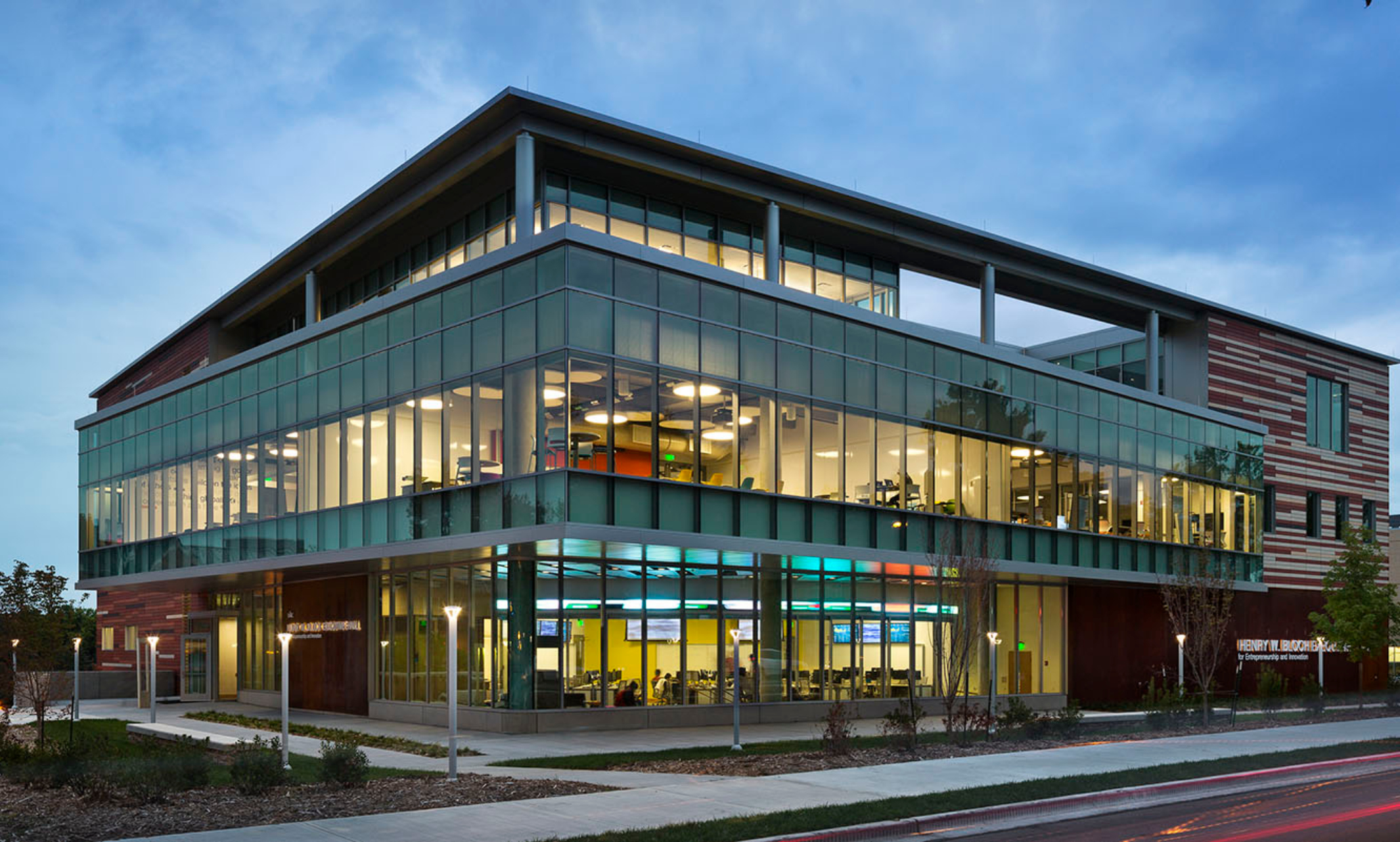
A conversation with Associate Dean Brian S. Anderson
From medicine to politics to business, data has become an essential power source. The University of Missouri-Kansas City Henry W. Bloch School of Management has infused data science throughout its curricula to empower the next generation of business leaders to understand and effectively wield data to deliver results.
Brian S. Anderson, associate dean of the Bloch School, has led the effort to make data science a foundational element of the school’s undergraduate and graduate curricula.
1. Content fine-tuned to student needs
At the undergraduate level, data analysis is infused into the overall curriculum, fine-tuned to specific emphasis areas such as accounting, finance and marketing.
For graduate students, the Bloch School is offering a Graduate Certificate in Business Analytics. Unlike stand-along certificate programs, this certificate is designed to provide an extra credential paired with a Bloch MBA or other Bloch graduate degree earned simultaneously.
2. Making Better Managers
Students explore the entire analytics lifecycle and develop business storytelling skills to effectively present data findings to key stakeholders. They get hands-on experience using cutting-edge analytical software such as Tableau, R, Python and SAS. Multiple software platforms are used interchangeably in a “platform-agnostic” approach.
“We’re not merely teaching people tech skills. Our goal is to produce better managers, so the content is taught in an engaged, immersive environment,” Anderson said. “We are teaching people data visualization – how to tell data-driven stories – irrespective of the tool used to analyze the data.
3. Local and regional relevance
A fundamental element of the Bloch approach to data science is deep engagement with the school’s many community partners – the Kansas City-area businesses and organizations that will be the future employers of Bloch graduates.
“We want to make sure that our curriculum is responsive and relevant to the Kansas City community,” Anderson said.
4. Data literacy matters
“We share Chancellor (Mauli) Agrawal’s view of data science, that its influence has become pervasive across the enterprise in numerous fields,” Anderson said.
While statisticians and other data scientists do the actual number-crunching, Anderson said business leaders need to know what questions to ask the scientists, how to interpret the answers and how to put the insights to work effectively.
“Business executives need to be data literate, and that also includes understanding the limitations of data. You can’t demand that data analysis provide you with information it isn’t capable of producing.”
5. Differentiation in the job market
The Bloch approach to data literacy gives Bloch graduates an advantage in a competitive job market.
“We see this as a way for our graduates to achieve differentiation as individuals with an ability to contribute immediately, and a high ceiling for growth.”
Nov 23, 2020
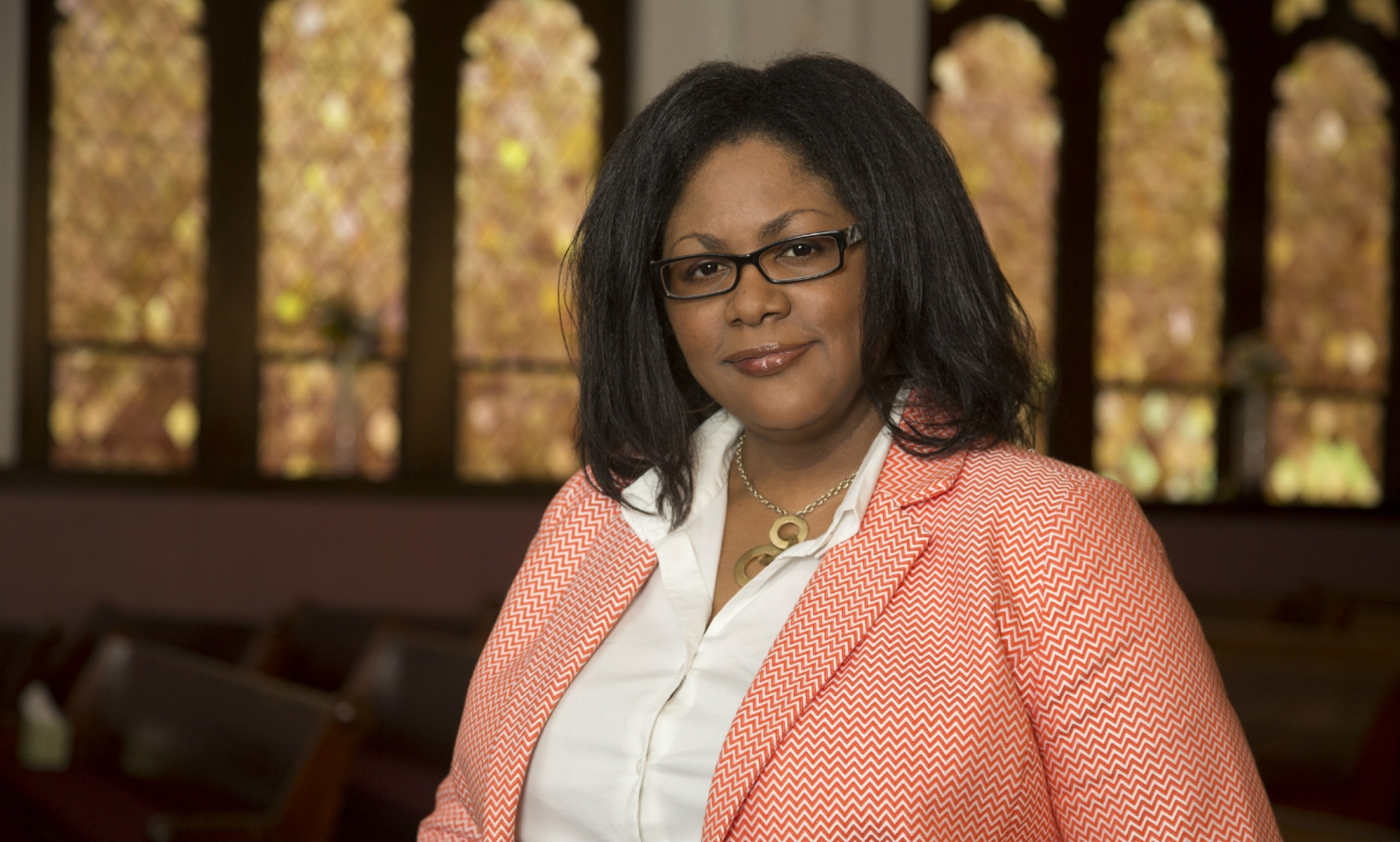
$1.9 Million in NIH funding to UMKC aids in lifesaving effort
COVID-19 has infected, hospitalized and killed Black Americans at a higher rate compared to whites. As it has with other racial health disparities, the University of Missouri-Kansas City is partnering with Black churches in Kansas City to fight this one. The National Institutes of Health has awarded UMKC a two-year, $1.9 million grant to do so as part of its Rapid Acceleration of Diagnostics-Underserved Populations (RADx-UP) initiative.
“By working with 16 churches, which are trusted institutions in the African American community, we will greatly expand COVID-19 testing opportunities and access to care in low-income areas of Kansas City,” said Jannette Berkley-Patton, Ph.D., principal investigator of the grant, director of the UMKC Health Equity Institute and a professor at the School of Medicine. “This RADx-UP grant will help people who probably never would have gotten tested get the support they need.”
The team of investigators on the grant are from UMKC, Children’s Mercy, University of Kansas Medical Center, University of Massachusetts, University of California-San Francisco and Johns Hopkins University. In addition to churches and their leaders and members, they will work in partnership with Calvary Community Outreach Network and the Kansas City Health Department for testing, contact tracing and linkage to care services.
“By working with 16 churches, which are trusted institutions in the African American community, we will greatly expand COVID-19 testing opportunities and access to care in low-income areas of Kansas City. This RADx-UP grant will help people who probably never would have gotten tested get the support they need.” - Jannette Berkley-Patton
“One of our aims with the grant is to not only expand testing but to also help get the community prepared for the vaccine,” said Mary Anne Jackson, M.D., an investigator of the grant, dean of the UMKC School of Medicine and an infectious disease expert at Children’s Mercy. “Vaccine confidence relies on trust and transparent communication of vaccine science and safety. The mistrust among people of color about the COVID-19 vaccine stems back toward experience in other research impacting this population, namely the Tuskegee trials in 1932 to study syphilis where Black males were not provided treatment.”
Key social determinants contribute to the disparities for Blacks and COVID-19 including essential public-facing jobs, cultural norms like medical and contact tracing mistrust and limited access to health care. African Americans also have a high burden of chronic health conditions including obesity, diabetes and heart disease, which put them at an increased risk for COVID-19.
Studies, including UMKC investigations led by Berkley-Patton, have shown that community-engaged research with African American churches has led to health screening uptake for HIV and STD testing and reducing risks for diabetes. Yet, no proven COVID-19 testing interventions exist for African American churches, which have wide reach and influence in their communities, high attendance rates and supportive health and social services for community members.
At churches, the grant aims to reach people through sermons, testimonials, church bulletins, and text messages. This also includes faith leaders promoting testing – and getting tested in front of their congregations – so that people can actually see what the testing process looks like.
To date, Berkley-Patton’s work has been supported by more than $12 million in federal grants over the past 14 years. The community-engaged research she has conducted in partnership with faith communities has benefited people in the Kansas City area as well as Alabama and Jamaica.
“At UMKC, we fight racial inequity at all levels, and that includes life-saving health care at our public urban research university,” said UMKC Chancellor Mauli Agrawal. “We are proud of the work Dr. Berkley-Patton is leading through proven strategies at places of worship. We know this team of investigators and their partners will help keep our community safer from COVID-19.”
Nov 23, 2020

5 questions with Vice Chancellor Chris Liu
UMKC achieved a major milestone in fiscal year 2020 by winning the highest amount of grant funding in its history: $48.9 million. The record coincides with the first year at UMKC for Chris Liu, the vice chancellor for research.
What factors contributed to achieving this milestone?
Dedicated faculty, researchers and supporting staff across the campus; clearly defined goals and the implementation of the UMKC strategic plan on research; the Chancellor’s new initiatives on data science and health disparities; interdisciplinary research in both STEM and non-STEM fields.
“UMKC is moving toward becoming a more refined urban research university through implementing initiatives such as the NextGen Data Sciences and Analytics Innovation Center (dSAIC) and UMKC Forward.” - Chris Liu
Chris Liu, vice chancellor for research at UMKC
Besides this, what has been your proudest achievement in your first year at UMKC?
In collaboration with Alexis Petri, director of faculty support, we won a National Science Foundation (NSF) STEM award to host a regional conference on increasing STEM retention and degree completion and preparing a diverse STEM workforce for the Kansas City metropolitan region.
This year, you also helped UMKC, in collaboration with California State University-Fullerton, earn one of 25 honorable mentions for the Idea Competition for the Symposium on Imagining the Future of Undergraduate STEM Education from the National Academies of Sciences, Engineering and Medicine. Tell us about it.
We proposed an idea to develop an artificial intelligence (AI)-driven learning system for giving undergraduate students personalized care on actively learning STEM fields in the classroom and beyond. The system would provide dashboard information on both students and their instructors to allow them to better understand each other, so that undergraduate STEM education and student learning become a more proactive practice in the future.
The goal is to help first-generation and students from underserved populations receive tailored academic advising. This will also help retention and graduation rates. It also fills a gap in resources for academic advisors.
We feel pretty wonderful about this idea. We’ve applied for a grant to fund this proposal.
Why is increasing research funding so important to the university’s future?
Increasing research funding at UMKC will help generate revenue; strengthen campus infrastructure and facilities for faculty development and student retention/graduation rates; enhance the university’s reputation for national rankings; and create opportunities for community engagement.
What opportunities are you excited about for UMKC?
UMKC is moving toward becoming a more refined urban research university through implementing initiatives such as the NextGen Data Sciences and Analytics Innovation Center (dSAIC) and UMKC Forward.
Nov 20, 2020
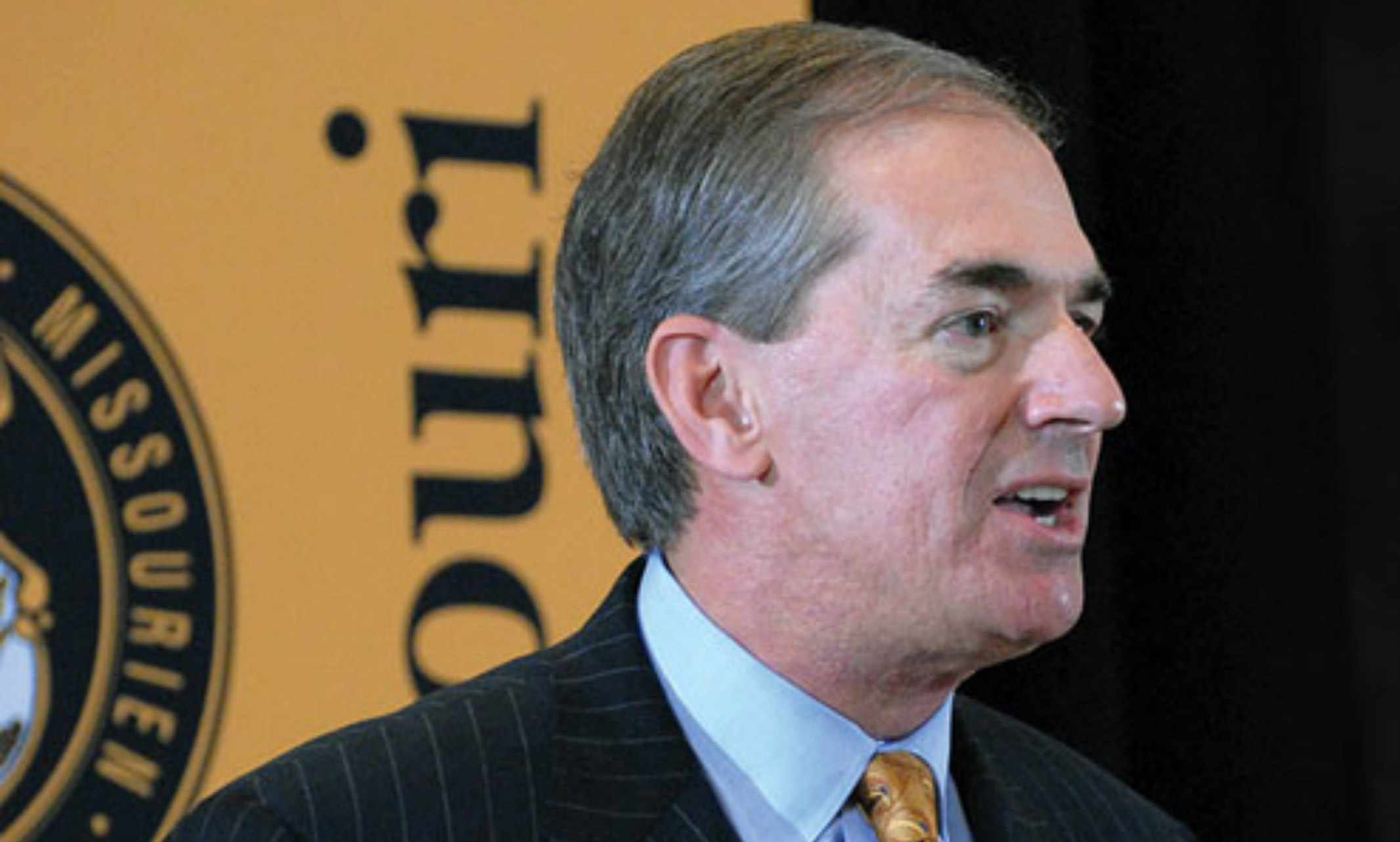
Gift supports a collaborative effort with MU housed at UMKC
Former UM System president Gary Forsee and Sherry Forsee have committed $2 million to support research that will provide data analytics to power the NextGen Precision Health initiative and other precision health research across the University of Missouri System’s four universities.
The gift will support the NextGen Data Science and Analytics Innovation Center, or dSAIC, which is based at the University of Missouri-Kansas City and operates in partnership with the University of Missouri-Columbia. UMKC will receive $1.2 million and MU will receive $800,000.
One role of the center will be to harness immense datasets to extract insights, patterns and knowledge, illuminating the work done at the NextGen Precision Health building, across the system’s institutions and health enterprises. The Precision Health building, currently under construction on the MU campus, aims to usher in a new era of personalized health care by developing medical breakthroughs to treat diseases based on individual variability in genes, environment and lifestyle rather than a one-size-fits-all approach.
The Forsees considered the project a great fit for their philanthropic interests, specifically in support of higher education in Missouri. Gary Forsee, a Kansas City resident and former UM System president, is a 1972 graduate of Missouri University of Science & Technology. He serves as a member of the UMKC Board of Trustees and an emeritus director of the UMKC Foundation as well as a member of the NextGen Advisory Board. With a background in the technology industry, he has a clear understanding of the key components necessary to provide the infrastructure for data research and engagement that benefit Kansas City and beyond.
“The ability to analyze vast amounts of data and apply that knowledge to some of today’s most critical health problems will have untold short-term and long-term impacts.” - Gary Forsee
“Through the development of NextGen Precision Health initiative and the UMKC NextGen Data Science and Analytics Innovation Center, we are helping to lay the groundwork for revolutionary changes in health care,” Forsee said. “The ability to analyze vast amounts of data and apply that knowledge to some of today’s most critical health problems will have untold short-term and long-term impacts.”
dSAIC creates a leading-edge data analytics center that can support university research across the state and play a critical role in health, business and workforce development across Kansas City and the region. The Forsees’ gift is the first step in making that happen.
“Looking back five years from now, we’ll judge the success of the center based on the outcomes,” Forsee said. “What systems have been put in place and what are the real project benefits of this center? I want to ensure that with the benefit of artificial intelligence, cloud computing, big data and data analytics that we’ve made significant progress in the NextGen Precision Health initiative.”
At MU, a portion of the gift will be used to build necessary computing infrastructure that supports pilot projects and collaborations between life science and health care experts and engineering faculty. Focus areas include security for medical health care records; DNA sequencing and analysis for individual patients; and automated diagnosis of medical imagery for precision health.
The expansion of big data capabilities within the UM System will be complementary to the personalized medicine research at UMKC hospital affiliates and MU Health Care, among other possibilities.
“Data isn’t just numbers on a spreadsheet or a chart.With our initiatives, we are using data to affect people’s lives. The Forsees’ gift enables us to continue that work and improve the lives of Missourians.” - Jannette Berkley-Patton
“As president of the UM System, Gary helped refine the vision of our NextGen initiative,” said Mun Choi, president of University of Missouri System and chancellor of University of Missouri-Columbia. “Now, with his continued work on our advisory board and his support in both Kansas City and Columbia, we are turning that dream into a reality.”
UMKC Chancellor Mauli Agrawal has reinforced the university’s strategy related to growing data science and research. Between the new Robert W. Plaster Free Enterprise Center, critical private-public research projects and a clear focus on building the research capabilities of the university through dSAIC, UMKC is positioned to capitalize on significant investments.
“Vision is critical, whether it involves something as finite as physical space or something as boundless as data analysis,” Agrawal said. “Beyond the benefit of the financial support, the Forsees’ gift is an invaluable validation of the importance of this initiative and its potential impact on the people of Missouri.”
Jannette Berkley-Patton, leader of the UMKC Health Equity Institute and a School of Medicine professor, is currently studying the potential health benefits of reliable and free public transportation in urban areas. Her work entails comparing data from more than 10,000 people.
“Data isn’t just numbers on a spreadsheet or a chart,” Berkley-Patton said. “With our initiatives, we are using data to affect people’s lives. The Forsees’ gift enables us to continue that work and improve the lives of Missourians.”
“Beyond the benefit of the financial support, the Forsees’ gift is an invaluable validation of the importance of this initiative and its potential impact on the people of Missouri.” - Chancellor Mauli Agrawal
Prasad Calyam, lead MU scientist on the project, associate professor of electrical engineering and computer science and director of the Cyber Education, Research and Infrastructure Center (Mizzou CERI) in the MU College of Engineering, said the funds will advance interdisciplinary collaborations in precision health.
“It will enable development of cloud computing expertise and knowledge bases in seamless integration of open/protected data sets as well as medical imagery analytics with intelligent automation using advances in machine learning and artificial intelligence,” Calyam said. “Resulting cyber and human resources will further strengthen partnerships with industry to develop secure and community-scale big data analytics environments that foster research and education innovations in precision health.”
Nov 19, 2020
David Thurmaier's podcast featured in national article
“I think the Anthology, especially the first volume, was incredibly important in The Beatles’ catalogue and story for a couple of reasons,” said David Thurmaier, who hosts I’ve Got a Beatles Podcast and is associate professor of music theory and chair of the Music Studies Division at the University of Missouri-Kansas City Conservatory. Read the story from YahooNews.
Nov 18, 2020

Four receive Entrepreneur of the Year awards
The University of Missouri-Kansas City honored four exceptional business leaders at its 35th Annual Entrepreneur of the Year awards Nov. 12.
The celebration, sponsored by the Regnier Institute for Entrepreneurship and Innovation at the university’s Henry W. Bloch School of Management, was conducted virtually due to the COVID-19 pandemic.
The evening’s program began with a Student Venture Showcase, followed by the awards program.
The 2020 honorees include:
Henry W. Bloch International Entrepreneur of the Year Award: Yvon Chouinard, founder, Patagonia. He was cited for his global impact for not only building a company but transforming his industry. Chouinard is an itinerant adventurer, passionate activist and iconoclastic businessman. In 1973, he founded Patagonia, a mission-driven company known for its environmental and social initiatives.
Kansas City Entrepreneur of the Year: Nathaniel Hagedorn, founder and CEO, NorthPoint Development. With 18 years of commercial real estate experience, Hagedorn has helped raise more than $7 billion in capital over the last eight years for the company’s real estate investments. The NorthPoint family of companies has grown to include the real estate development and management company, an international logistics and freight forwarding firm, a third-party logistics company, warehouse technology and supply-chain integration company, and an industrial architectural and engineering firm.
Marion and John Kreamer Award for Social Entrepreneurship: Robert W. Hatch, chairman and CEO, Cereal Ingredients, Inc. and Great Plains Analytical Lab. Hatch founded Cereal Ingredients, a specialty-food ingredients manufacturer, and Great Plains Analytical Laboratory in 1990. Hatch is also Chairman of FINCA International (Foundation for International Community Assistance), a not-for-profit microfinance organization with a mission to provide financial services to the world’s lowest-income entrepreneurs so they can create jobs, build assets and improve their standard of living. FINCA pioneered the “village banking method” of credit delivery, which offers small loans and a savings program to those without access to traditional banks.
Student Entrepreneur of the Year: Jonaie Johnson. Currently a Dean’s List business student and athlete at UMKC majoring in entrepreneurship, Johnson started her company, Interplay, when she was accepted into the Bloch School E-Scholars program. Interplay is working towards automating pet interaction by providing dog owners with an interactive, automated dog crate. Last year, she was a starter on the UMKC Roos Western Athletic Conference champion women’s basketball team.
Tom and Mary Bloch, son and daughter-in-law of Bloch School patron and namesake Henry W. Bloch, served as the evening’s co-hosts.
“One thing Dad was really big on was finding creative solutions to our toughest challenges, and tonight, right now, our friends at UMKC and the Bloch School are showing us how that’s done,” Tom Bloch said.
Chancellor Mauli Agrawal thanked the Bloch family for their continuing support and involvement at UMKC.
“Their generosity has helped us continue our efforts to increase access to higher education and inspire students to use their entrepreneurship to lend a helping hand and make the world a better place,” Agrawal said. “We are taking real-world challenges and issues and finding solutions and opportunity through entrepreneurial problem-solving. It’s what Henry would have done, and it’s what we will continue to do…and then some.”
As part of the unique virtual format, this year’s program included a panel discussion among three local entrepreneurs on the topic of adjusting to the “new normal” of the pandemic. The panel was moderated by Maria Meyers, executive director of the UMKC Innovation Center. Participants included Chris Beier, co-founder, Strange Days Brewing Co.; Riddhiman Das, co-founder and CEO, TripleBlind; and Lyndsey Gruber, founder and CEO, PEPPR.
The program also featured an appeal for continued support of the Bloch School’s Summer Scholars program, a beneficiary of the Entrepreneur of the Year program proceeds. Summer Scholars is a 2-week intensive summer program for incoming freshman and transfer students.
Ben Williams, assistant teaching professor at the Bloch School and managing director of the Regnier Institute; and Ali Brandolino, president of the UMKC Enactus team and last year’s Student Entrepreneur of the Year, discussed the program’s features and benefits.
“The goal of Summer Scholars is to kick start students’ college careers, help them build an entrepreneurial mindset that can be applied to any career track, and to encourage the students to get involved in the amazing programs and organizations at the Bloch School,” Williams said.
“As a past participant in the Summer Scholars program, I have seen the benefits,” Brandolino said. “It taught me the basics of entrepreneurship that I've used in many other courses, Enactus and my own business. Early in my journey I learned how to ideate, interview, prototype, test, and pitch.”
The Entrepreneur of the Year Awards event is an iconic Kansas City tradition started in 1985. Beyond its philanthropic cause, this event is a valuable forum where Kansas City CEOs, entrepreneurs, business owners, industry legends, world-class faculty and students alike are able to celebrate a common passion. The event celebrates entrepreneurial spirit and serves as a source of inspiration to future generations of innovative entrepreneurs.
All proceeds from this event directly benefit the Regnier Institute for Entrepreneurship and Innovation’s student and community programs. The Regnier Institute at the Bloch School focuses on connecting students and community members with a comprehensive combination of world-class research, renowned faculty, cutting-edge curriculum and experimental programs driven to deliver results and nurture the next generation of entrepreneurs.
Nov 16, 2020
The Pitch features KCSourceLink annual event
“GEWKC (Global Entrepreneurship Week Kansas City) continues to be the largest celebration of entrepreneurship in the region, and we have seen firsthand the difference made in supporting our vibrant local small business community,” said Jenny Miller, chief organizer for GEWKC, and senior director of regional ecosystem development at the UMKC Innovation Center. Read the article. (Website registration required)
Nov 16, 2020
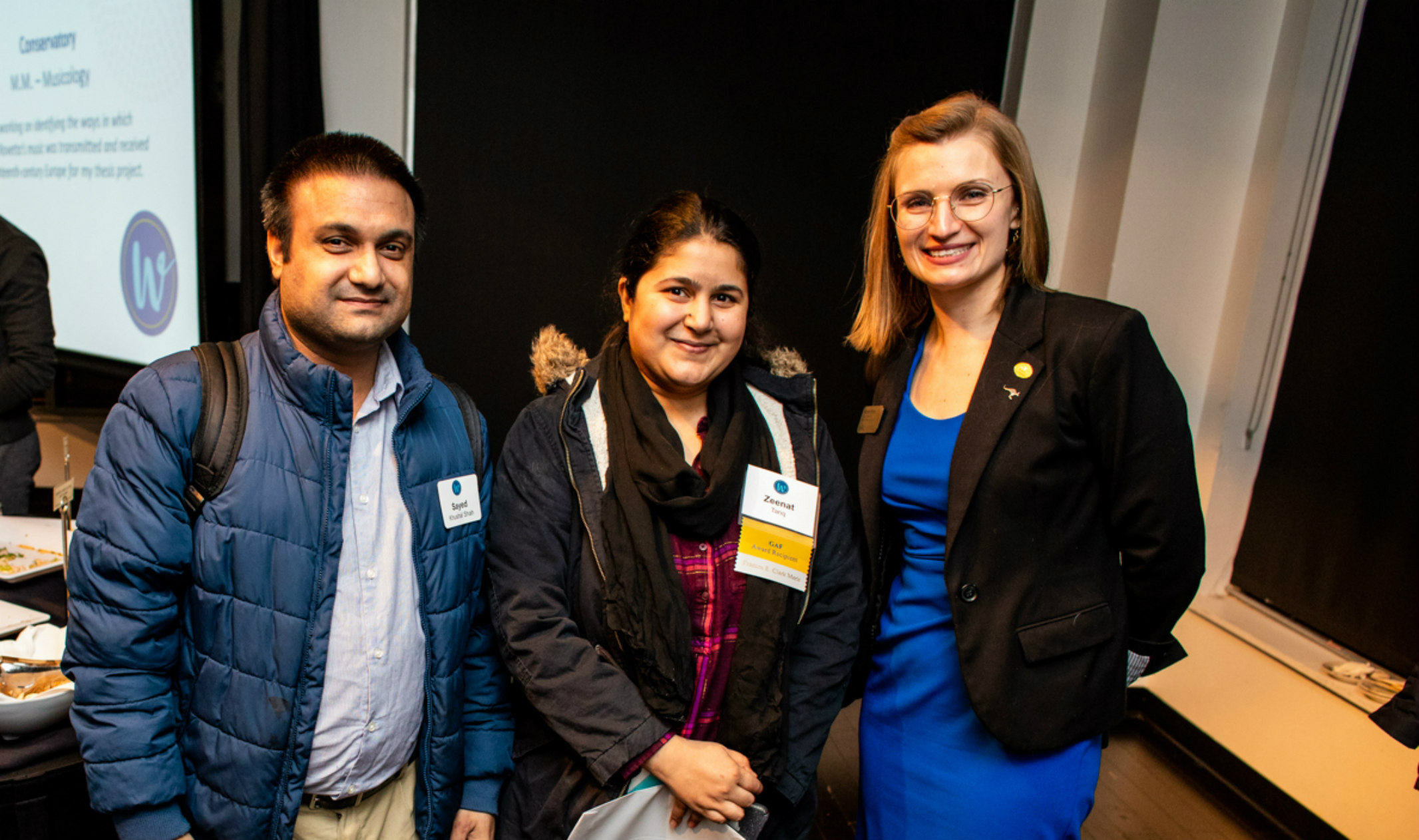
New funding creates opportunity for STEM mentorship
Building a career in engineering as a woman 40 years ago had its challenges, but Janet Williams, B.S.M.E. '83, succeeded and is reaching out to young women to give a hand up through scholarships and mentoring.
“I like to joke that I’m an accidental engineer,” Williams says. “I didn’t discover engineering until I was hired at Burns & McDonnell Engineering in 1979.”
Williams was an exemplary student whose parents understood her opportunities.
“I was the first person in my family to earn a college degree,” she says. “My first degree was actually in Spanish.”
But working at Burns & McDonnell among engineers changed her trajectory.
“Once I figured out what engineers did, I thought, ‘I can do this.’ And I embarked on a three-year endeavor of part-time and full-time classwork at UMKC to graduate with my B.S.M.E. in 1983.”
Williams was part of the charter group that founded the UMKC chapter of the Society of Women Engineers (SWE) while she was in her senior year.
“The women in SWE were a wonderful support group for a new engineer who lacked self-confidence among her male peers in the workplace,” she says. “They helped me see what I brought to the table, taught me how to dress professionally and gave me leadership opportunities in STEM outreach."
When Williams moved to Albuquerque, New Mexico in 1989, she was disappointed to find there was not a SWE chapter there. With a group of other women engineers who understood the particular pressures of being a woman in a field dominated by men, they formed the Central New Mexico Professional Section of Society of Women Engineers.
“We were all grateful for the support we had getting to where we were, so we were all happy to give back by conducting outreach programs, giving science fair awards to young women and eventually establishing several scholarships for women in engineering.”
Williams notes that Albuquerque is a particularly culturally rich area with a large population of Hispanic and Native American residents, both groups that are largely underrepresented in the field. In addition, Williams knows that research shows that having role models is a hugely important factor in girls pursuing engineering - something they often lack.
“It has been gratifying to see the young women we have awarded scholarships to go on to graduate with a degree in engineering, or to be inspired to continue with math and science in high school so they can be ready for engineering or other STEM careers when they enter college.”
Despite her success in Albuquerque, she wanted to do more. While she had considered a scholarship for women in engineering at UMKC in her estate planning, she wanted to have a more immediate impact.
“This award motivates student research and attracts women to the field. The self-confidence it builds can change the world through science and technology.” - Janet Williams '83
“That’s when I became aware of the Women’s Graduate Assistance Fund, which was especially appealing for several reasons,” Williams says. “It was more affordable than most endowments. I was able to designate the award for a woman in SCE and it was able to be awarded immediately, rather than waiting for years. These were all very important factors to me.”
Earlier this year, Williams made a gift to the UMKC Women’s Graduate Assistance Fund to establish the Jan Williams and Family Award for Excellence in Computing & Engineering. Williams first award recipient, Zeenat Tariq, is pursuing a doctorate in computer science.
“Zeenat is an engineer who is pursuing her education while raising a family like I did,” Williams says. “Her research in machine learning focuses on classifying sounds and their applicability to detect changes in the environment and the human body, and she has already published five papers in two years of graduate work.”
Tariq is researching using machine learning for early detection and diagnosis for diseases – such as those that affect the heart and lungs – through human body sounds. This technology would provide the ability to detect abnormalities earlier than standard tests. Her scholarship furthered her progress and opportunities.
“This award helped me further my career by allowing me to submit my research for publication and travel to present a paper where I had a chance to meet people from my field and gain more exposure to science and technology and share research with my community,” Tariq says.
As a mother of a young child she would have had a difficult time attending without these funds. She would like to be able to help students like her when she is an established professional like Williams.
Williams is happy to participate in Tariq’s journey as well as the paths of other women like her.
“This award motivates student research and attracts women to the field,” Williams says. “The self-confidence it builds can change the world through science and technology.”
Nov 11, 2020
Beth and Greg Vonnahme offer expertise on elections
Beth and Greg Vonnahme, UMKC Political Science Department professors, have been interviewed by local media for months about the 2020 general election. Since Election Day, their expertise has been sought-after. Here are a few of the latest media interviews.
‘Can’t close that gap’: Marshall’s path to US Senate victory, KSHB, Greg Vonnahme
Here’s how Trump’s election legal challenges could play out, Fox4KC, Greg Vonnahme
Kansas advance-ballot law speeds up election results, KSHB, Beth Vonnahme
2020 Election Analysis, KCUR, 2020 Election Analysis
Nov 10, 2020
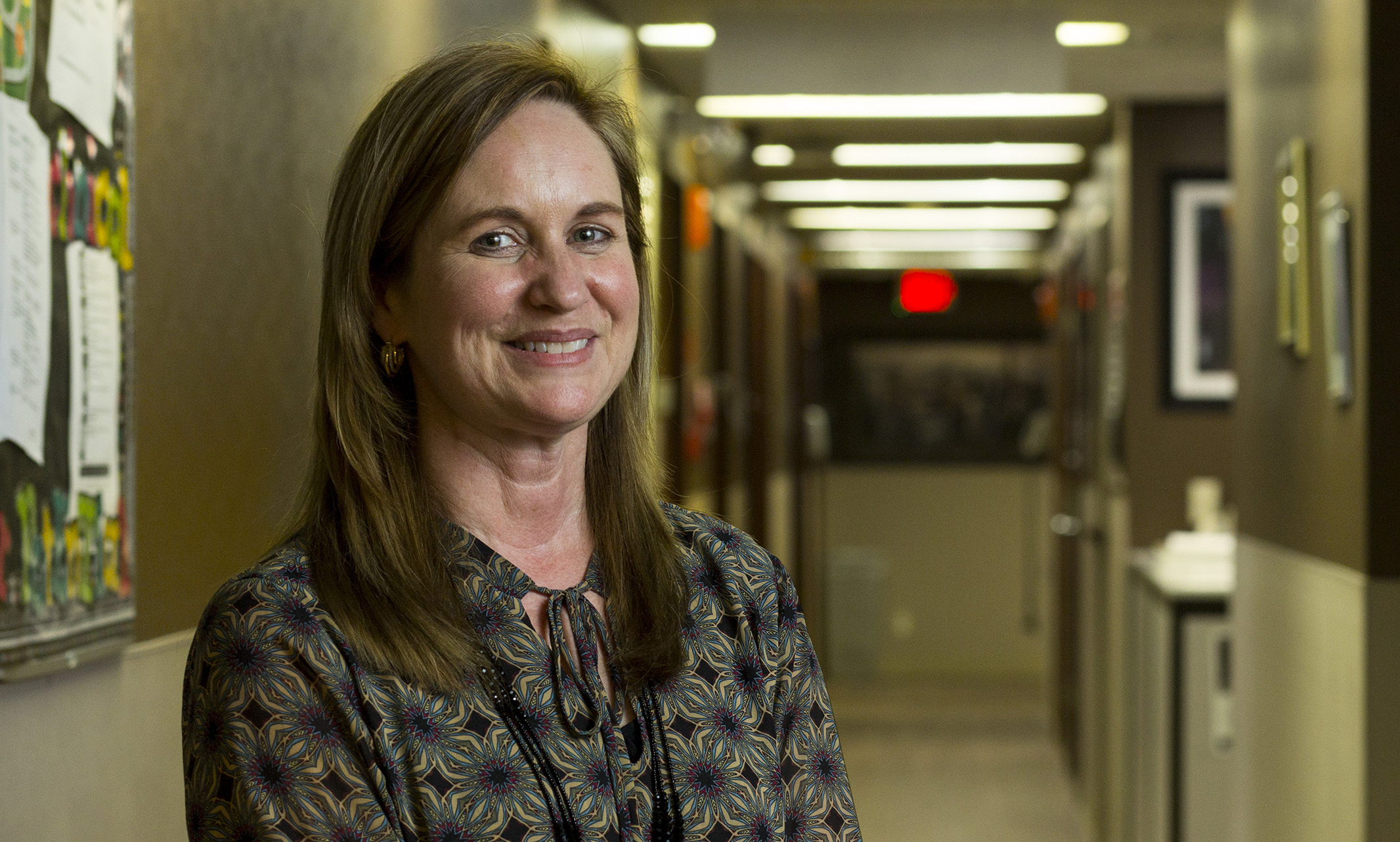
Opioids prescribed in conjunction with other medications raises concerns
A team of researchers at the University of Missouri-Kanas City School of Pharmacy is taking a close look at prescribing trends for opioids used as pain management medications for older residents in nursing homes. Moreover, they are exploring how often opioids are being prescribed in combination with other medications to reduce pain.
Maureen Knell, Pharm.D., a clinical professor at UMKC and clinical pharmacist at Saint Luke’s Health System Medical Education Internal Medicine Clinic, says the teams is particularly looking at how opioids are being used in nursing homes in conjunction with other medications that can impact the central nervous system.
Prescribing multiple medications on top of opioids can have a significant effect on older adults and create an increased risk for adverse events ranging from falls to constipation to affecting cognitive function.
“These are things that we are concerned about and watch out for in our practice every day,” Knell said.
With data collected from four long-term care facilities in Missouri, Mark Patterson, Ph.D., M.P.H., associate professor of pharmacy, has created a registry of more than 1,800 medications and supplements to track medication discrepancy during transitions of care among 126 nursing home residents. It can be used to characterize prescribing patterns among various subsets of patients with different diseases and different medications.
Working with Knell and fellow researchers Melissa Palmer, Pharm.D., clinical assistant professor, and Kaylee Huffman, a third-year UMKC pharmacy student, Patterson is looking not only at the types of opioids being prescribed, but also additional medications that are sometimes prescribed at the same time to treat pain or other comorbidities.
One overarching concern, he said, is the concept of polypharmacy in which patients are being prescribed more than five different medications at the same time, sometimes for the same condition.
“When that happens in an older group of patients who are also on opioids, that's a very high-risk mixture going on,” Patterson said. “So, we are very interested in looking further into the trends with regards to this high-risk population.”
Knell said finding patients on multiple drugs that affect their central nervous system such as antidepressants, antipsychotics or antianxiety medications such as valium and diazepam on top of opioids for pain management particularly raises a red flag.
“Those types of agents combined with opioids, that's something that the guidelines are pretty clear on, that those increase the risk of undesirable effects when you combine them with opioids,” she said.
Another concern that Patterson brings up is transition of care, when older adults go back and forth between hospital and the nursing home. When older patients are seen by multiple care providers, it creates a complicated dynamic in light of those patients receiving multiple prescribed medications.
“We are seeing potentially dangerous combinations of medications being prescribed,” Patterson said. “We don’t know yet the exact number or the rates, but it is concerning.”
The information the UMKC research team is gathering will be a potentially valuable tool for the vast array of health professionals involved in providing care for older adults. In addition to the staff of nurses, physicians and pharmacists in the nursing homes, those in hospitals and individual primary care physicians all have hand in managing the residents’ medications as well as the community pharmacists supplying them.
“It’s important that all health care providers, patients and caregivers appreciate and understand the significance and implications of these prescribing trends,” Patterson said. “Especially with older adults residing in nursing homes or discharged from hospitals who are prescribed opioids.”
Looking forward, Knell said data outlining the prescribing trends of opioids in conjunction with adjuvant, non-opioid medications will hopefully help policy makers and individual clinicians make better decisions on how different medication go together or even whether they should be used together. It could also potentially be applied to a broader range of adults or other special populations.
“I think there are a broad range of possibilities with this,” she said.
Nov 09, 2020
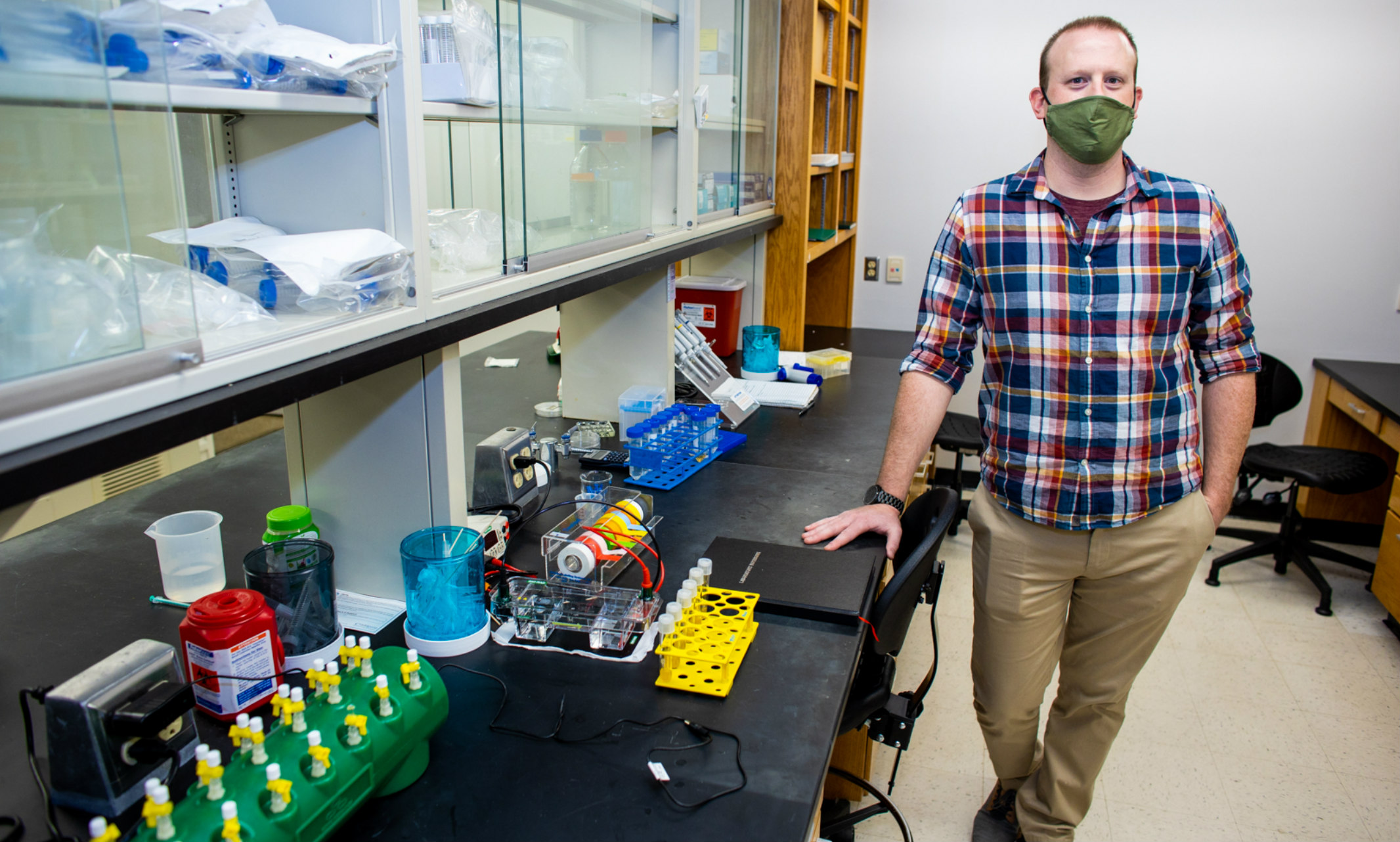
Advances in the study of plant virus transmission may lead to breakthroughs in human health
Jared May joined the School of Biological and Chemical Sciences as Kansas City and the rest of the world was beginning to shut down because of COVID-19. While May adjusted to the move from Washington D.C., he pursued research into how plant viruses evade detection in host cells, and how it relates to human virus pathogenesis.
Your research focuses on how RNA plant viruses are able to circumvent antiviral pathways of potential host cells. What led you to this specialty?
Viruses have been infecting every lifeform since the beginning of time. This tug of war between a host and a virus has been like a molecular arms race. They’re always fighting trying to get the upper hand. That’s one of the things I find remarkable about viruses -- even though they infect such diverse organisms, they are closely related. They share so much in common that what you find in one virus many times will translate to other viruses.
Does this type of research lend itself to human viruses? COVID-19 for example?
My research focuses on RNA metabolism pathways that inhibit plant virus replication. Interestingly, these pathways are present in animals and are known to target coronaviruses like COVID-19. By determining how plant viruses have evolved to survive in their host cells, we will gain a better understanding of how viruses like COVID-19 must adapt to survive in human cells. This work has the potential to uncover virus features that could be targeted by vaccines or antiviral therapeutics.
"Viruses have been infecting every animal since the beginning of time. This tug of war between a host and a virus has been like a molecular arms race." - Jared May
Some people did not absorb the significance of the spread of COVID-19 immediately. How did you react when you become aware of the virus’s potential?
My first concern was that based on the virology conferences that I’d attended, I knew that studying coronaviruses wasn’t extremely popular. The first major outbreak was SARS and there haven’t been new cases since around 2003. So, the interest in the field had died down and shifted towards more recent outbreaks like Ebola. Because of that, there wasn’t a lot of ongoing research.
How does the current focus on coronaviruses relate to your work?
Both coronaviruses and plant viruses are targeted by their host cells using shared pathways. So, I’m trying to leverage what I’ve already found in plant viruses and see if this this novel coronavirus exploits similar attributes to fight the human antiviral response.
What led you to this specialty?
In graduate school I became interested in viruses and infectious disease. I studied human noroviruses that often cause outbreaks on cruise ships. But there are unique benefits in working with plants. For one, the cost is significantly cheaper.
It’s a difficult time to move to a new city. How are you adjusting? Have you had time to explore?
Yes, it is unfortunate timing! But my wife and I just had our first baby. She’s a year old, so sometimes it’s easier to stay home!
Nov 09, 2020
KCUR investigates dearth of Black detectives on Kansas City police force and its ability to solve violent crime
KCUR interviewed Toya Like, criminal justice professor at the UMKC Department of Criminal Justice and Criminology; and Sean O’Brien, criminal law professor at the University of Missouri-Kansas City School of Law and a former public defender. Read the full article.
Nov 09, 2020
KCUR interviews School of Law professor
UMKC law professor Mikah Thompson said the allegations are troubling. Overall, the separation agreements are “fairly standard,” according to Thompson. She teaches employment law and has about 15 years of experience as an employment attorney. Read the full article.
Nov 04, 2020
Legal contests underway in Kansas and Missouri are likely continue well past Election Day
Beth Vonnahme, associate dean at UMKC, College of Liberal Arts and Sciences and associate professor of political science, was a guest on Up to Date.
Nov 03, 2020
Book by author Ibram X. Kendi offers foundation for 2020 Social Justice Book Lecture
For the 2020 UMKC Social Justice Book Lecture, the Division of Diversity and Inclusion hosted a panel discussion centered on the New York Times bestselling book “How To Be An Antiracist” by Ibram X. Kendi.
The conversation included topics such as agreeing on a common understanding of the term “racist,” understanding the framework of systemic racism and why equity is a lot like justice.
Meet the panelists:
Cecilia Belser-Patton, principal and culture curator of JUST Systems
Gwendolyn Grant, president and CEO of the Urban League of Greater Kansas City
Rodney D. Smith, Ed.D., vice president for access and engagement at William Jewell College; co-founder of Sophic Solutions, LLC.
Mikah Thompson (moderator), associate professor at UMKC School of Law
Ajamu Webster, CEO/founder, structural engineer at DuBois Consultants
Below are some excerpts from the conversation.
“The system is getting exactly what it was designed to get. It was designed to oppress Black people, it was designed to suppress our ability to engage in American capitalism. And so it has created this persistent and pervasive divide across all quality of life indicators.” —Gwendolyn Grant
“When we hear the term [racist] levied and people have such umbrage and take such offense. ‘Oh no, I’m not a racist.’ What I think people mean is, ‘I’m not a hate monger.’ Because we’ve done such a poor job of defining how race really works in our society. Most of the time when I’m talking about race and racism it’s in the structural and systemic sense.” —Rodney D. Smith
“No matter what else we do, that intersection of race is always coming in, no matter how many degrees we have, no matter what we earn. People got real irritated with me when I said you can’t out zip code race. You cannot. You can live wherever you want to live, you can choose to live wherever you want to live and there will still be an intersection of our race in all of that.” —Cecilia Belser-Patton
“As long as [racism] is looked at as a moral issue, then moral suasion can be an option that might have benefit, but moral suasion isn’t enough when the entire economic, political, social, cultural and — before scientific — structure was set up to justify the founding and continuation of the American project at the expense of African people.” —Ajamu Webster
Watch the event recording below.
Nov 02, 2020
Bloch School associate professor comments on accessing capital
Accessing capital is difficult without a positive credit history. Many entrepreneurs use their homes as collateral for loans. But that also makes it harder for Black homeowners who live in historically redlined areas where home values are lower, said Brent Never, an associate professor at the University of Missouri-Kansas City Henry W. Bloch School of Management. Read the full article from the Kansas City Star. (subscription required)
Nov 01, 2020
Boston Globe interviews Max Skidmore
Even by doing too little on the virus — at least in the view of his detractors — Trump still occupies the center of the debate. “Though Trump blusters, he’s militant about his passivity and has divested all his responsibility on COVID,” said Max Skidmore, UMKC Curators' Distinguished Professor of Political Science, and Thomas Jefferson Fellow, and author of a book on presidential leadership during health crises. Read the full article.
Oct 31, 2020
